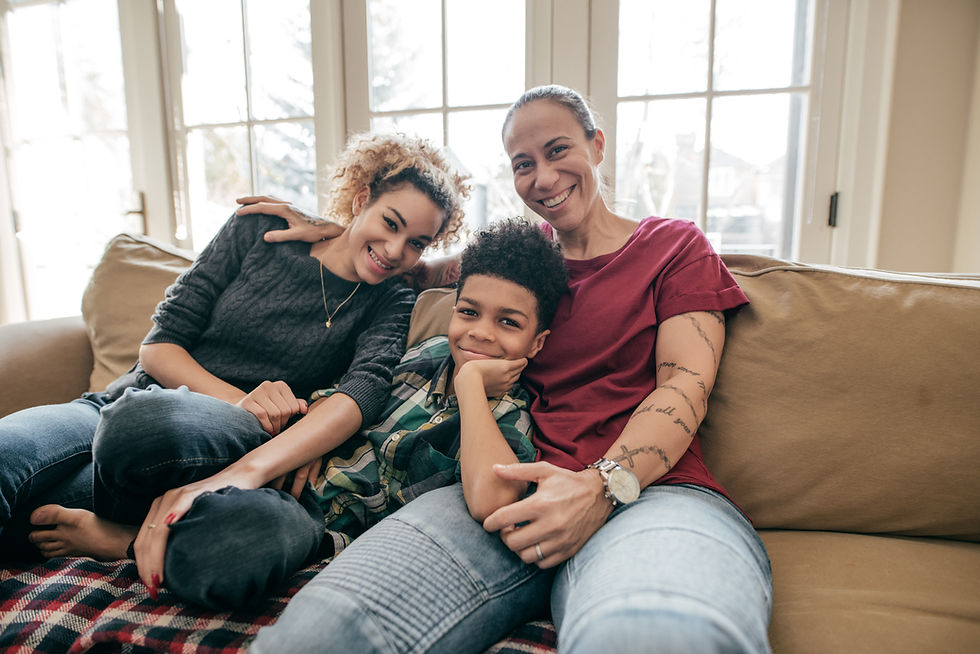Does My Child Have Obsessive Compulsive Disorder (OCD)?
- drmorvwenduncan

- Aug 2, 2023
- 5 min read
By Dr Morvwen Duncan, Clinical Psychologist and Founder of The Lotus Psychology Practice
Whether it's "We are all a little bit OCD", or "You are so OCD" because you like to be clean, we have all heard of the myths surrounding OCD. OCD is one of the most misunderstood mental health difficulties. This article will tell you what OCD actually is as well as how to support your child.

Firstly, What is Obsessive Compulsive Disorder?
OCD is characterised by a pattern of unwanted, intrusive, and distressing thoughts, images, or impulses known as obsessions, and repetitive behaviours or mental acts known as compulsions. Common examples of obsessions include fears of contamination, germs, sexual, religious or causing harm to oneself or others. Compulsions can manifest in various forms, such as excessive handwashing, repetitive checking, counting, arranging objects, or seeking reassurance from others. Compulsions are actions taken by the individual to try to reduce the distress caused by the obsessions. These behaviours are often excessive, time-consuming, and interfere with daily life and normal functioning.
OCD affects an estimated 0.25%–4% of children and adolescent, and in addition to causing significant distress and impairment in children, it can persist into adult life where the World Health Organisation (WHO) ranks it as one of the most impairing illnesses.
What causes OCD?
We don't know exactly why some people develop OCD, and others don't. What we do know is that it is likely a mix of several biological, neurological, psychological and environmental risk factors. This includes genetic risk factors, as OCD is more likely to run in families, neuropsychological factors and psychological risk factors, such as perfectionism and traumatic or adverse experiences (Krebs & Heyman, 2015).
OCD has a high co-morbidity with neurodevelopmental conditions, such as Autism Spectrum Disorder, Tic Disorder/Tourette Syndrome, Attention Deficit Hyperactivity Disorder and psychological difficulties such as Anxiety, Body Dysmorphic Disorder, Depression or Conduct Disorder. It is essential to consider these co-occuring conditions during the assessment and treatment of OCD. Proper evaluation and management of these comorbidities can improve the overall outcome for your child.
What Keeps OCD going?
The maintenance of OCD is influenced by various factors, including cognitive and behavioural elements. Here are some key factors that contribute to the persistence of OCD:
Reinforcement of Compulsions: Compulsions provide temporary relief from the distress caused by obsessions. When your child engages in these behaviours, they experience a decrease in anxiety, which reinforces the belief that the compulsion is necessary. Over time, this reinforcement strengthens the link between obsessions and compulsions, making the cycle harder to break.
Avoidance and Safety Behaviours: People with OCD often engage in avoidance behaviours to prevent triggering their obsessions. For example, someone with contamination obsessions might avoid touching doorknobs or other objects they consider "dirty." Similarly, they may use safety behaviours such as wearing gloves or washing hands excessively to feel protected. These avoidance and safety behaviours maintain the cycle of OCD by preventing individuals from learning that their fears are unfounded.
Cognitive Distortions: Young people with OCD often have cognitive distortions, such as catastrophic thinking or overestimation of threat. They may believe that if they don't perform their compulsions, something terrible will happen. These distorted beliefs fuel the need to engage in compulsive behaviours as a way to prevent perceived harm.
Intrusive Thoughts: The intrusive and distressing nature of obsessions makes it challenging for children to ignore or dismiss them. The more they try to suppress these thoughts, the more persistent they become, leading to increased anxiety and a stronger urge to perform compulsions. It's like trying to push a beach ball down in the sea... you can keep trying to push but it will keep popping up!
Reassurance: Your child may naturally seek your reassurance or ask you to support their rituals or compulsions. Giving your child reassurance may help in the short term, but in the long term it feeds your child's anxiety, as it sends the message that there is danger to be protected from and that the compulsion was needed.
Treatments for OCD
The National Institute for Health Excellence guidelines recommend evidence-based psychological therapies such as Cognitive Behavioural Therapy (CBT) with exposure and response prevention (ERP), adapted to the young persons developmental age and neurodevelopmental profile.
Cognitive-Behavioural Therapy (CBT): CBT is the most effective treatment for paediatric OCD. It involves identifying and challenging negative thought patterns and beliefs (cognitive distortions) that contribute to OCD symptoms. The psychologist or therapist helps the individual develop healthier ways of thinking and responding to obsessions. The primary technique used in CBT for OCD is Exposure and Response Prevention (ERP)...
Exposure and Response Prevention (ERP): ERP focuses on gradually exposing the individual to situations or objects that trigger their obsessions. During exposure, the person learns to resist engaging in the usual compulsive behaviours (response prevention). Over time, repeated exposure without giving in to compulsions helps to reduce anxiety and weaken the association between obsessions and compulsions.
Family involvement: OCD takes over both the young persons life, but also the lives of their families. When your child is feeling anxious, they are likely to turn to you for help or reassurance. This may involve asking you lots of questions, or asking you to complete certain compulsions "please check the door one more time". Giving your child reassurance may help in the short term, but in the long term it feeds your child's OCD symptoms. It is therefore important that treatment of OCD should involve parents/carers to consider how OCD has taken over.
Medication: Medication, such as selective serotonin reuptake inhibitors (SSRIs) may also be used if a young person is unable to engage in therapy.
Will my child recover?
The rate and speed of recovery can vary depending on various factors, including the severity of the condition, the age of onset and the presence of comorbidities. Several studies have explored the prognosis of OCD in children, with findings consistently demonstrating the efficacy and effectiveness of evidence-based treatments. A substantial proportion of children and adolescents will respond with full or partial remission to CBT.
If you are worried about your child's symptoms, you can get in touch with us at The Lotus Psychology Practice to arrange an initial consultation with a Clinical Psychologist to discuss your concerns.
Resources:
1. http://www.ocdaction.org.uk/
2. https://www.youtube.com/watch?v=6Fo8snUyA54
3. Challacombe, F., Oldfield, V. B., & Salkovskis, P. M. (2011). Break Free from OCD: Overcoming Obsessive Compulsive Disorder with CBT. Random House. 4
4. Derisley, J., Heyman, I., & Robinson, S. (2008). Breaking Free from OCD: a CBT guide for young people and their families. Jessica Kingsley Publishers.
5. Wells, J., & Heyman, I. (2006). Touch and Go Joe: An Adolescent's Experiences of OCD. Jessica Kingsley Publishers.



Comments